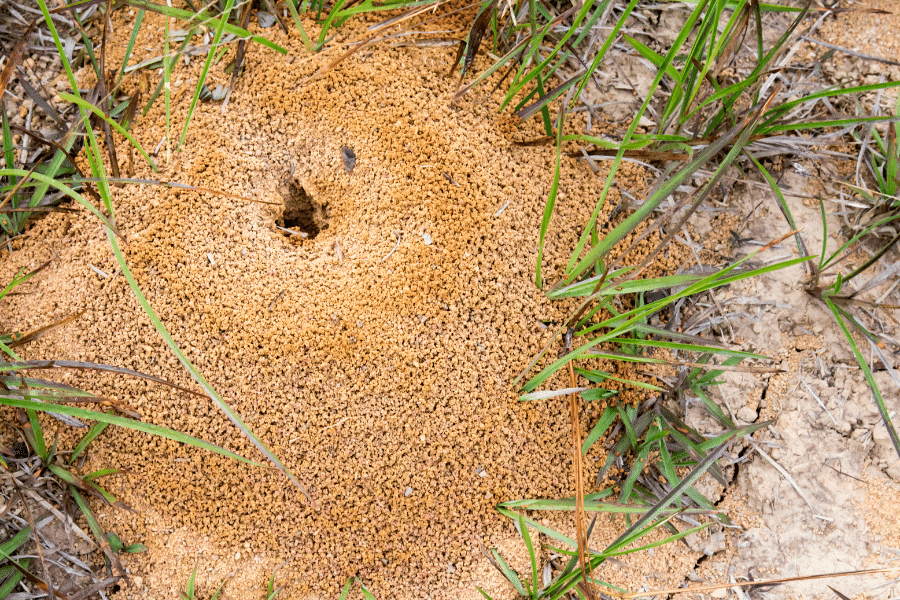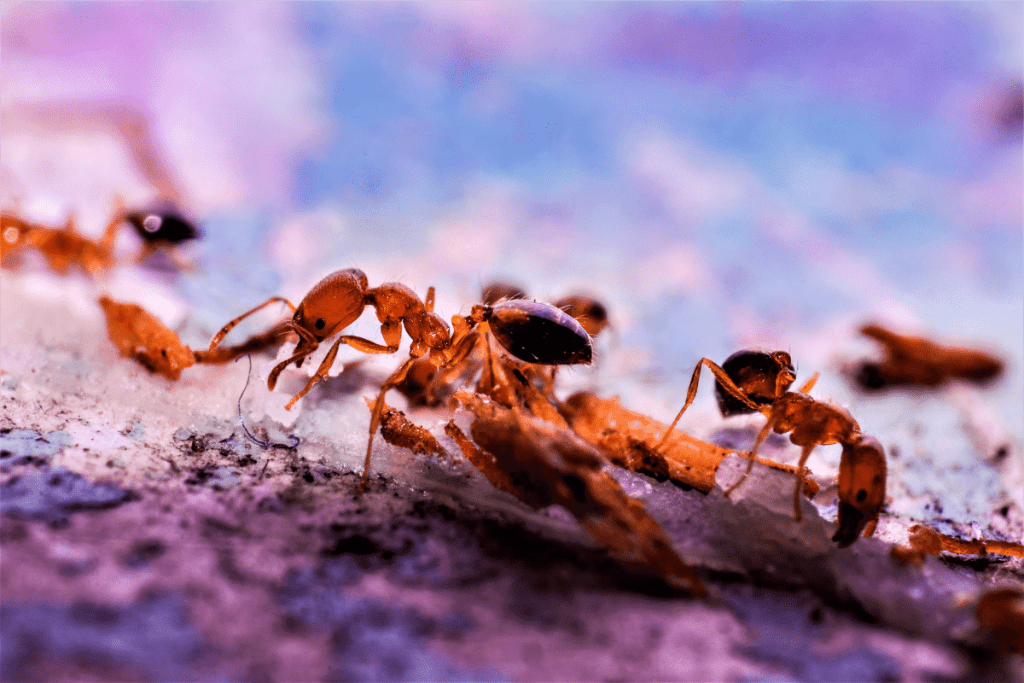If unsightly ant hills have appeared in your yard, you have an ant infestation.
Ant colonies are annoying because their mounds ruin the look of your picture-perfect lawn, and they are potentially harmful to your turf grass.
Moreover, if you have fire ants, they cause significant problems due to their aggressive behavior and painful stinging, which often results in allergic reactions.
If left alone, your ant problem will only get bigger, so how do you remove ant hills to ensure they don’t come back?
Whether using natural or chemical means, the key to permanently removing ant hills is to induce the colony to move or kill the queen(s) so the entire colony dies out. To discourage new, migrating queens from establishing new colonies of ants, eliminate nearby water and food sources.
Keep reading to understand the hows and whys of ant colonies and learn about the best natural and chemical remedies to rid your yard of ant mounds permanently.

Table of Contents
Why Do Ants Build Hills In Your Yard?
Ants are colony insects that choose dry, well-drained soil for their nests.
They build complex underground tunnels with various chambers to provide shelter and house food, eggs, and the queen ants, who reside at the deepest level.
Only certain types of ants, such as field ants or fire ants, will build ant hills in your yard.
The little mounds are made of excess soil removed from the ground by worker ants digging tunnels for their underground nests, which they pile around the entrance.
There are multiple reasons ants build these mounds.
They act as entrances to the nest, help keep the nest dry, regulate the inside temperature, and help protect it from intruders or predators.
The presence of multiple ant hills does not necessarily mean you have multiple nests or colonies; this may be due to a single colony of ants with a large underground nest with many entrances and exits.
Why Remove Ant Hills?
What we are asking here is why get rid of ants which are often considered beneficial insects?
If not dealt with early, you may end up with a giant ant colony whose tunnels do both significant structural and cosmetic damage to your entire lawn.
Ant nests damage turfgrass.
The dirt mounds smother it preventing it from getting the sunlight it needs to grow, killing the grass under the mounds.
In addition, ant tunneling activity can destroy your grass roots and cause the soil to dry out, resulting in dead patches.
Ants also feed on mycorrhizae.
The fungi form a symbiotic relationship with grass roots, enabling them to better take up water and essential nutrients.
By stripping the roots, the ants will help deprive your grass of nutrients.
Some ants also protect and “farm” aphids and mealybugs to use as a food source.
These insects will feed on and destroy your desirable plants and veggies while secreting a thick sugary liquid called honeydew which is used to feed the colony of farming ants.
In the case of fire ants, in addition to their aggressive, stinging behavior, they tend to attack electrical wiring.
They destroy it by chewing through the cable insulation, causing short circuits and other problems.
Do you have other yard pests?
Check out our tips for how to get rid of soil mites from your yard.
How To Remove Ant Hills All Over Your Yard (Naturally)

Although they take persistence and repeated treatments, there are several natural remedies for eliminating ant nests by either killing them or inducing them to move.
Once they have left or have a dead ant colony, removing the ant hills is as simple as raking away the mounds.
When dealing with fire, ants always wear protective clothing to prevent their caustic bites.
Rake The Mounds
Although not a method to kill the colony, raking out the mound of a newly established nest every week may be sufficient to disturb the ants and induce them to move on.
Ants prefer peaceful locations, so persistent raking of the entire hill every time it reappears will send the message that the locale is not safe or suitable.
However, because ants are persistent, you may need to resort to more drastic measures.
Pour Boiling Water
A no-cost option is to pour boiling water into the ants’ nest.
The heat will kill the ants in contact, and the water will help to collapse the tunnels.
The only drawback is boiling water can kill the grass in the area, and you may need to reseed.
This natural remedy may require multiple applications and is only practical for smaller nests where the queen is near the surface and can’t escape.
It’s unlikely to be effective in situations where you have ant hills dotted across your yard, indicating an extensive network of potentially deep tunnels and chambers.
To ensure you have killed the queen, watch for signs of ant activity for the next several days.
If you see signs of the ants attempting to rebuild, repeat the treatment or use a second method to target the queen.
Spread Diatomaceous Earth
Another natural method is to dust diatomaceous earth (DE) around the nest openings.
The calcium, magnesium, and potassium in DE will provide your lawn with nutrients while also killing the ants.
DE is composed of tiny shards of marine animals called diatoms that kill ants by puncturing their protective exoskeleton and absorbing the external waxy layer, protecting them from dehydration.
Because it doesn’t work immediately, ants re-entering the nest will transport the DE inside to contact other ants.
Rather than killing the entire colony, DE treatment normally helps to move them.
If you have children or pets, the use of food-grade DE is highly recommended.
Use Boric Acid Or Borax With Sugar
A particularly effective solution is to use boric acid or borax because both are highly toxic to ants and will kill the whole nest.
Mix them with water and sugar or honey to create a paste and place it near the nest entrances.
The paste will act as a natural ant bait which worker ants will take back to the nest to feed the queen.
Once the queen is dead, the rest of the colony will soon follow.
Take care when using this remedy because it’s also highly toxic to children and pets; the use of a bait station like this one is recommended.
Use Hot Soapy Water
Dilute soapy water (3%) is another natural remedy for dealing with your ant issues.
Although it’s usually hard to drown ants, soapy water breaks down the natural surface oils on ants causing them to sink and helping water enter their breathing tubes, which drowns them.
It also destroys any chemical trail they may have left, reducing the probability of new ants arriving.
Dish soap is effective; borax is even better because it is also toxic to ants.
If possible, boil the soapy water before you pour it into the nest; the combined action of the temperature and soap will kill more ants.
As with other natural remedies, repeated treatments may be required to kill the queens.
Feed The Ants Baking Soda
Baking soda kills ants quickly after they ingest it, although the reason for its toxicity is not well understood.
To make a natural ant bait from baking soda, mix it with the confectioner’s sugar and place it in locations near the entrances to the nest, then let the ants do the work.
They will take it back to the nest, killing any ant that eats it within minutes, including the queens.
Use Bleach, Vinegar Or Salty Water
Ants are also killed by pouring large quantities of white vinegar, bleach, or salty water into the nest.
However, the biggest issue with these approaches is they will permanently kill off your lawn in the immediate and adjacent areas, and nothing new will grow again, so for this reason, they are not recommended.
Chemical Methods For Getting Rid Of Ant Hills All Over Yard
If you don’t wish to use natural remedies or have not been successful despite your persistence, chemical treatments are available to provide you with effective options.
For fire ants, choose products specially formulated to eliminate them.
Use Commercial Ant Bait
Several types of ant baits, including liquid and granular ant baits, use the same principles.
Ant baits contain an attractive food source combined with small amounts of either a slow-acting toxin or an insect growth regulator.
For baits containing slow-acting toxins, worker ants have time to return to the nest to share it with other ants, including the queens, who will die shortly after eating it.
These baits are designed to work rapidly and kill the whole nest quickly.
Baits containing insect growth regulators do not kill ants but interfere with the queens’ egg production and prevent ant larvae from developing into new adults.
Because worker ants are not replaced, the colony dies out.
Spread Ant Granules
Ant granules are granular insecticides used to eliminate existing ant infestations and deter new ants from moving in.
Use a professional product like Bifen LP Granules, specifically targeting worker ants, and distribute it across your entire yard.
If you localize its use around the ant mound, the ants will relocate to another spot.
Ant granules require water activation and continue to have residual activity for several months following re-watering or rainfall.
Use Pesticide Dust
Similar to diatomaceous earth, sprinkle or dust the mound openings with professional-grade pesticide dust.
Worker ants re-entering the nest will transport it inside and spread it to other ants, larvae, and queens.
Drench The Mound
The mound drench method is considered most effective for getting rid of ant colonies because it will kill the queens.
Use an insecticide containing bifenthrin, which targets many ant species and has lasting residual activity.
Dilute in water following the specific directions on your product, then use it to flood the mound and surrounding area.
Hire A Professional To Get Rid Of Ant Hils
If you have a heavy infestation that you cannot deal with successfully using DIY treatments, or you want help finding a long-term solution, a pest control specialist will solve your ant problems.
Discourage New Ant Colonies In Your Lawn
Once you have eliminated ant colonies and ant hills from your yard, it’s time to take a disciplined approach to discourage ant hill reinfestation or new ant infestations.
Ants are attracted to locations where there are good food and water sources, so make sure these items aren’t readily available to make your home and yard as unappealing as possible.
Practice good sanitation to deprive ants of food sources by keeping trash cans containing food well away from your house and yard and eliminating any available sources of water such as:
- Leaking Spigots
- Lone Flower Pot Saucers
- Bird Baths
- Potted Plants Containing Excess Water
To discourage new ants from taking up residence, use ant granules or natural deterrents, including:
- Mint plants
- Diatomaceous earth
- Cayenne pepper
- Cinnamon